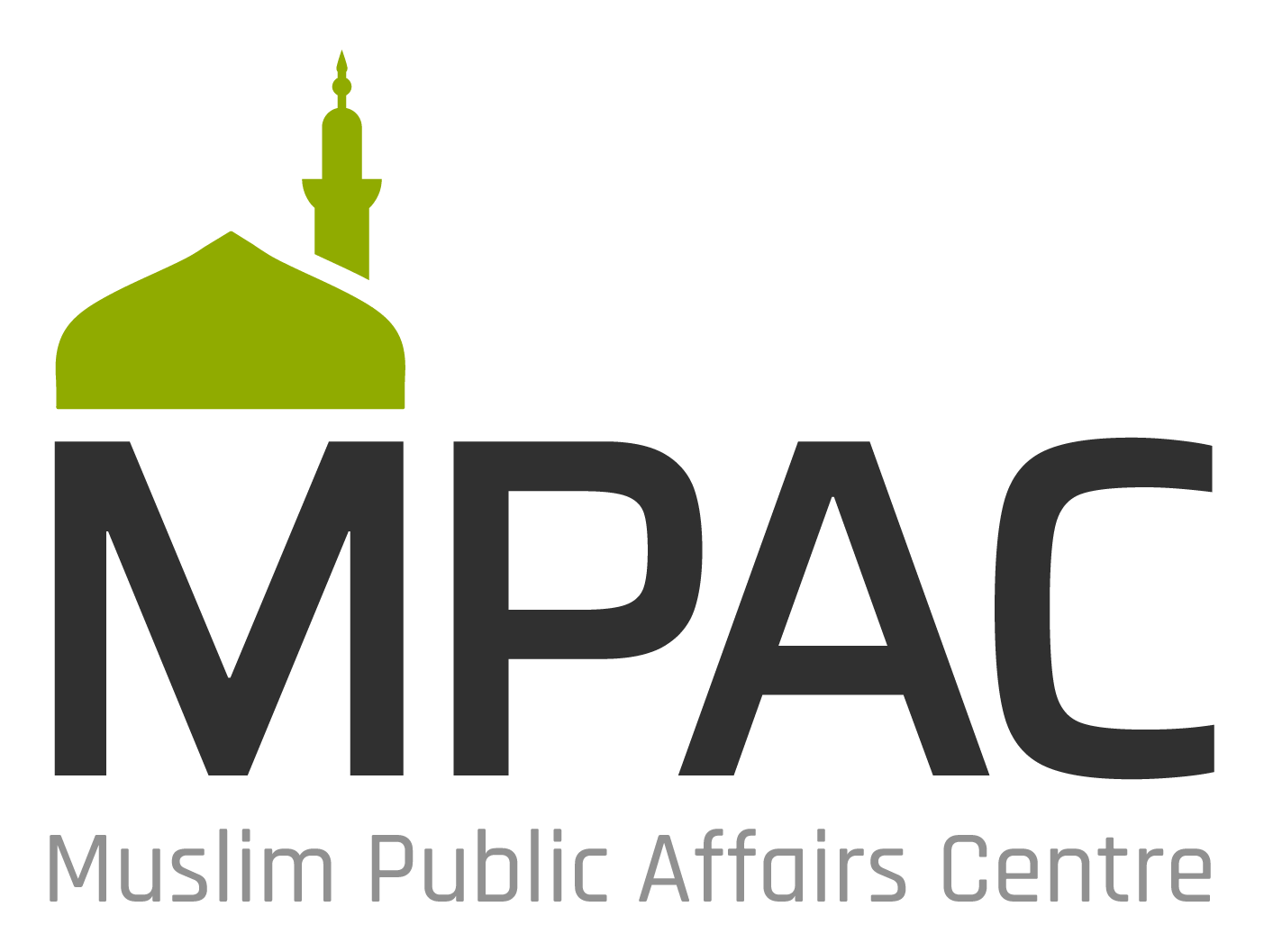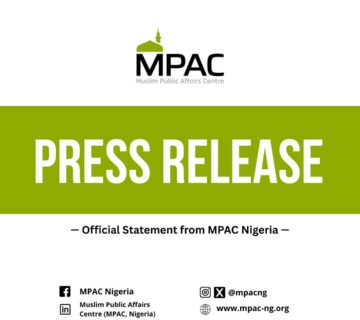In the name of Allah, the Most Compassionate, the Most Merciful
(Lagos, Monday, 13/10/2025)
The Muslim Public Affairs Centre (MPAC) Nigeria expresses deep concern over the circular issued by the National Insurance Commission (NAICOM) on August 19, 2025, prohibiting coinsurance arrangements between Takaful operators and conventional insurance companies. While we acknowledge NAICOM’s statutory mandate to regulate and protect the integrity of the insurance sector, we strongly believe that this policy undermines the very essence of financial inclusion and market development that Nigeria strives to achieve.
A Brief Context: Takaful in Nigeria
Takaful (Takaful insurance is a type of Islamic insurance that operates in accordance with Shariah principles. It’s based on mutual cooperation, solidarity, and shared responsibility among participants) was formally introduced into Nigeria’s regulatory space in 2013, when NAICOM released its first guidelines to provide a framework for Islamic insurance operations. Since then, growth has been steady but modest. Takaful companies today account for less than 2% of the Nigerian insurance market. Compare this to conventional insurance, which has existed in Nigeria since 1921, when Royal Exchange Assurance established the first insurance office in Lagos. That gives conventional insurers over a century of accumulated trust, capital, and market penetration advantages Takaful simply does not yet enjoy.
The Unfair Exclusion
Given this context, it is deeply concerning that NAICOM is excluding Takaful companies from partnering with conventional insurers, effectively erecting barriers between a nascent industry and a mature one. For an industry still struggling to build scale and visibility, collaboration with mainstream players could provide credibility, product innovation, and wider distribution. Instead, this policy risks further isolating Takaful and cementing its marginal role.
By contrast, global best practices show that hybrid or collaborative approaches often help emerging ethical finance models take root. Malaysia’s Takaful industry, for example, flourished by initially working closely with conventional institutions before developing full independence.
Consumers Lose Out Too
Takaful, as a strategic tool, extends insurance protection to underserved populations excluded due to religious and ethical considerations. Coinsurance arrangements between Takaful operators and conventional insurance companies can foster:
– Increased market access: Collaboration can enhance the reach of Takaful operators, promoting financial inclusion and market deepening.
– Improved customer choice: By allowing coinsurance, customers can benefit from a broader range of insurance products, tailored to their specific needs.
– Enhanced competition: Partnerships can stimulate innovation, driving growth and development in the insurance sector.
– Sharing of expertise and resources: Collaborating to develop new products and services, and improving operational efficiency.
Potential Consequences of the Ban
The prohibition of coinsurance arrangements may inadvertently:
– Stifle innovation: Limiting partnerships may hinder the development of new insurance products and services.
– Reduce market penetration: The ban may restrict the growth of Takaful operators, ultimately affecting the overall insurance penetration in Nigeria.
– Contradict national goals: This policy may undermine Nigeria’s financial inclusion strategy and Sustainable Development Goals (SDGs).
The real victims of this exclusion are not just the Takaful operators, but consumers. In a country where insurance penetration is already abysmally low widely reported to be below 2% of GDP limiting choice further undermines trust and accessibility. Nigeria’s population is overwhelmingly uninsured, and among them are millions of Muslims and ethical consumers who may prefer Takaful but still need the reach and stability that comes with broader insurance networks. By closing doors to collaboration, NAICOM inadvertently makes financial inclusion even harder.
Useful Examples of Coinsurance
There are countries around the world that demonstrate the potential for cooperation between Takaful and conventional insurance, promoting financial inclusion and catering to diverse customer needs.
– Malaysia: A pioneer in Takaful insurance, Malaysia allows conventional insurers to participate in Takaful, promoting financial inclusion and industry growth.
– United Arab Emirates (UAE): The UAE has a well-established Takaful industry, with many conventional insurers offering Takaful products alongside conventional insurance.
– Saudi Arabia: As one of the largest insurance markets in the Middle East, Saudi Arabia has a growing Takaful industry, with some conventional insurers partnering with Takaful operators.
– Indonesia: Indonesia’s Takaful industry is growing, with some conventional insurers offering Shariah-compliant products.
– Pakistan: Pakistan has a significant Takaful market, with several Takaful operators and conventional insurers offering Islamic insurance products.
A Call for Balance
Safeguarding Shari’ah principles is important, and NAICOM’s concern for the integrity of Takaful is valid. However, integrity should not mean isolation. The real challenge is to create structures that allow Takaful to remain true to its principles while benefiting from the experience, infrastructure, and resources of conventional insurers. Rather than a blanket prohibition, NAICOM could explore regulated models of partnership that ensure compliance without exclusion.
Rather than banning coinsurance arrangements outright, NAICOM can preserve the integrity of Takaful through regulation:
– Stringent risk management practices: Implementing robust risk assessment and management systems to mitigate potential risks.
– Transparency and disclosure: Ensuring that Takaful operators and conventional insurance companies provide clear and accurate information about their coinsurance arrangements.
– Regular monitoring and oversight: Conducting regular audits and inspections to ensure compliance with regulatory requirements.
Conclusion
Nigeria’s insurance sector cannot afford to deepen division at a time when the priority should be broadening participation and trust. Takaful is still in its infancy and cutting it off from collaborative opportunities risks stunting its growth permanently. The question NAICOM must answer is simple: If insurance penetration is already under 2%, and Takaful itself under 2% of that, how does exclusion serve the national agenda of financial inclusion?
Also, it is worth noting that the Central Bank of Nigeria (CBN) allows cooperation between conventional and Islamic banks, with no evidence of compromise in the banking sector. This collaborative approach has enabled the growth of Islamic banking in Nigeria, while maintaining financial stability.
We believe that a balanced approach, fostering cooperation between Takaful operators and conventional insurance companies, will promote financial inclusion, market development, and customer satisfaction. We urge NAICOM to revisit this policy and work towards creating a more inclusive and dynamic insurance sector. By embracing balance and inclusion, NAICOM can create a more vibrant and sustainable insurance sector, ultimately contributing to Nigeria’s economic growth and development.
Recommendations
1. Establish clear guidelines and regulatory frameworks for coinsurance arrangements.
2. Implement stringent risk management practices.
3. Ensure transparency and disclosure in coinsurance arrangements.
4. Conduct regular monitoring and oversight. By embracing cooperation and regulation, NAICOM can promote the growth of Takaful while maintaining the integrity of the insurance sector.
Contact:
Disu Kamor
Executive Chairman
Muslim Public Affairs Centre
4, Wilmer Street, Awosika Bus Stop, Isheri-Berger, Lagos, Nigeria
Phone: 08076049545




